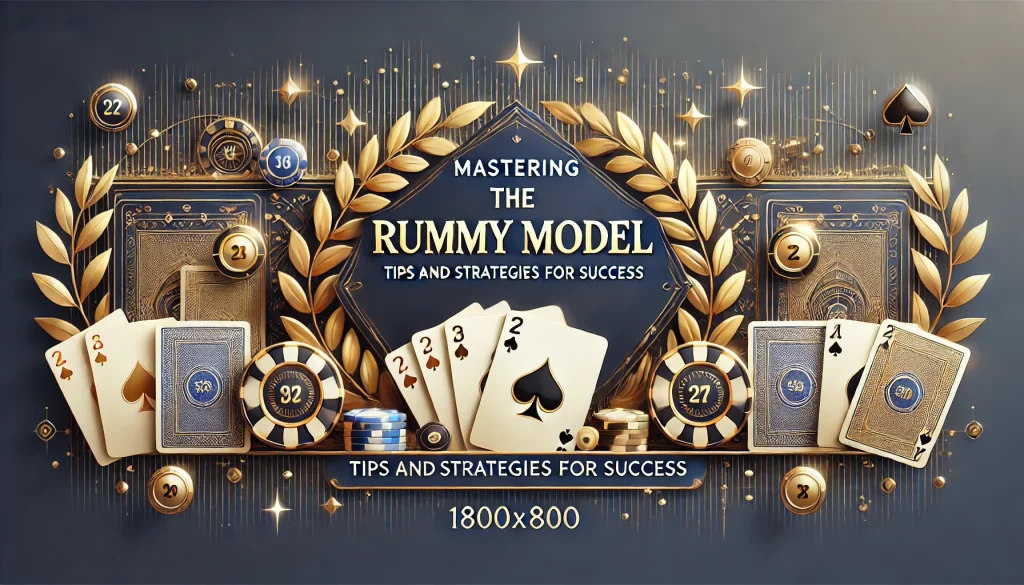Description

Understanding the Rummy Model: rummy culture A Complete Guide Rummy is a card game that has been played for generations and has taken on many different forms & 777 slots cultural adaptations. Forming legitimate sets and sequences from a hand of cards is the main goal of the Rummy model. Classic 777 Slots APK Two to six players may participate in the game, which usually uses a standard 52-card deck. After a predetermined number of cards are dealt to each player, the remaining cards are arranged in a draw pile, with one card facing up to begin the discard pile. Any player hoping to succeed must comprehend the fundamentals of the game’s structure and rules.
Drawing cards from either the draw pile or the discard pile & discarding one card at the conclusion of each turn are the basic rules of rummy. The goal of the game is for players to arrange their cards into melds, which can be runs (three or more consecutive cards of the same suit) or sets (three or four cards of the same rank). Understanding the strategic components that can affect the result is just as important to the game as knowing these fundamental guidelines.
Players need to anticipate the moves of their opponents, be aware of those moves, and modify their strategies accordingly. The dynamic interaction between defense and attack is what distinguishes Rummy as a skill-based game as opposed to a game of chance. A winning mindset in rummy is defined by a combination of self-assurance, tolerance, and flexibility. Players need to develop an optimistic outlook that enables them to stay calm and focused under pressure.
Given how frequently Rummy can take unexpected turns, this mental toughness is essential. For example, an opponent’s strategic play may cause a player to hold onto cards that are no longer useful. Remaining composed and reevaluating one’s approach are essential for success in these situations.
Moreover, cultivating a winning mindset requires adaptability. Every Rummy game has different conditions depending on the cards dealt & the strategies of the opponents. Based on these factors, a successful player must be prepared to modify their strategy. This could entail changing from an aggressive approach that emphasizes swiftly forming melds to a more defensive posture that places more emphasis on preventing opponents from finishing their sets.
The overall gaming experience is improved and a player’s chances of winning are increased when they adopt a flexible approach. In rummy, effective card management is essential to success. In addition to keeping track of one’s own cards, this entails paying close attention to the cards that opponents are drawing & discarding. Players who have a well-organized hand can quickly spot possible melds and determine which cards are best to keep or discard. When a player has several cards in the same suit but varying ranks, for example, they should focus on making runs while keeping in mind possible sets. Players should also come up with a way to group their cards according to possible melds.
To help with faster decision-making during gameplay, this may entail sorting cards according to rank or suit. If a player has three hearts and one diamond, for instance, they may concentrate on making a run with the hearts while deciding whether to save the diamond for a possible set at a later time. Players can improve their overall performance and expedite their gameplay by effectively managing their cards. The majority of Rummy’s strategic depth is found in the discard & draw phase.
Players have a lot of control over their own hand and their opponents’ ability to form melds, so they must carefully consider which cards to draw from the pile and which to discard. Monitoring which cards opponents have discarded is a popular tactic because it can reveal important details about their possible hand combinations. For example, you can tell that your opponent is switching to a new strategy if they discard a card that you think they were holding onto for a set. Players should also exercise caution when discarding cards that might help their opponents.
For instance, it could be prudent to keep any related cards rather than throwing them away if you observe an opponent amassing cards of a specific rank. In contrast, strategically discarding a card that has no use but might aid an opponent in finishing a meld can throw off their plans. Rummy is transformed from a straightforward card game into a sophisticated contest of cunning by its dual emphasis on opponent observation and personal strategy. A player’s chances of winning can be significantly increased by knowing how to form melds and sets, which is the main goal of rummy.
A meld is made up of three or more cards that are either of the same rank (sets) or in a run. The secret to creating these melds is to identify patterns in your hand and take the initiative to draw or discard cards that fit those patterns. To finish a run (7-8-9) or find another 7 to form a set (7-7-7), for example, you might concentrate on drawing more hearts if you have two 7s and an 8 of hearts. Depending on the cards at hand, the ability to switch between forming runs and sets is essential. Players should also consider the possibility of making multiple melds at once; for instance, keeping both 6-7-8 and 7-8-9 gives them the flexibility to form various combinations as the game goes on. Jokers are very useful tools in rummy because they are wild cards that can be used to represent any other card in melds or sets.
Their authority carries responsibility, though; if you use them effectively, you can change the course of events, but if you misuse them, you risk missing out on opportunities. Players should think about how the joker will best serve their current hand while simultaneously monitoring possible plays in the future. To create a set or a run with adjacent numbers, for instance, you can use the joker as a third 5 if you have two 5s and one. Nevertheless, using jokers to increase your chances of completing several melds at once is frequently more strategic.
Compare the possible advantages of using your joker against the obvious tactics of your opponents if you have multiple options. There may be more benefits to holding onto a joker until it can finish a critical meld than to using it too soon. One crucial component of rummy that new players frequently ignore is defensive play. Making your own melds is vital, but so is being able to prevent your opponents from finishing theirs. This entails choosing which cards to discard strategically in addition to knowing what cards they are collecting.
If you observe that your opponent frequently selects particular ranks or suits from the discard pile, it might be prudent to keep related cards in order to stop them from finishing their melds. Blocking can also affect your own choices during gameplay. For example, if you have several cards to discard but one of them might help an opponent finish their run or set, it’s usually preferable to select a different card that doesn’t help them as much. Because of this defensive mentality, players must be alert and flexible at all times; they must not only be conscious of their own hands but also of how their actions affect other players at the table. Players must delve into more complex strategies that can give them an advantage over rivals in order to fully grasp the Rummy model.
One method is card counting, which may seem difficult at first, but it can provide important information about what is still in play by recording which cards have been played. Players can make better decisions about their own hands by keeping track of which high-value cards have been drawn or discarded. Another sophisticated tactic is psychological play, which is recognizing your opponents’ patterns & taking advantage of them.
You might decide to play more cautiously when your opponent is probably holding strong hands, for instance, if you know they have a tendency to play aggressively when they have particular cards. Also, bluffing can be a useful strategy. You can deceive opponents and open doors for yourself by discarding cards that appear to support one strategy while covertly pursuing another. Although it takes experience & practice to integrate these sophisticated strategies into your gameplay, doing so can greatly improve your Rummy performance. Players who improve their ability to spot patterns & predict their opponents’ moves will not only win more games but also take pleasure in the complex strategic dance that characterizes this classic card game.lottery sambad old

